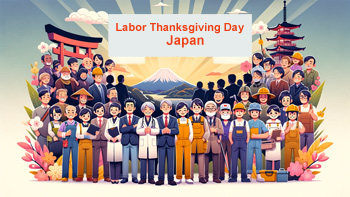 Labor Thanksgiving Day in Japan
Labor Thanksgiving Day in Japan


Labor Thanksgiving Day in Japan, known as 'Kinrō Kansha no Hi', is a unique holiday celebrated annually on November 23rd. This day is not just a time off work; it's a day dedicated to commemorating labor, celebrating productivity, and expressing gratitude to one another for the year's hard work. Deeply rooted in both history and modern practices, Labor Thanksgiving Day reflects Japan's respect for labor and its commitment to societal harmony. In this exploration, we'll dive into the history of Labor Thanksgiving Day, its traditional and contemporary practices, and its significance in Japan’s societal fabric.
The origins of Labor Thanksgiving Day date back more than a thousand years to an ancient harvest festival called 'Niiname-sai'. Originally a Shinto ritual, the emperor offered the year's first harvest to the deities and prayed for a bountiful harvest in the coming year. In the post-war period, in 1948, this tradition was repurposed to create Labor Thanksgiving Day, a holiday to honor labor, celebrate productivity, and express gratitude to workers.
Celebrating Workers and Productivity
One of the main focuses of Labor Thanksgiving Day is to acknowledge and appreciate the contributions of workers in various sectors. Across the country, events and ceremonies are held to honor the hard work and achievements of laborers. Companies and organizations often use this day to express their gratitude to their employees through special events or tokens of appreciation.
Public events such as concerts, festivals, and parades are also organized in different parts of the country, celebrating the achievements of workers and the importance of their contributions to society. These events often include activities for children and families, emphasizing the importance of teaching future generations the value of hard work and gratitude.
Community Service and Volunteerism
Labor Thanksgiving Day also encourages community service and volunteerism. Many people take this opportunity to engage in community improvement projects, volunteer activities, and charity events. Schools organize programs where children learn about various professions and the significance of contributing to society.
This focus on community service during Labor Thanksgiving Day highlights the Japanese concept of 'kyōsei', which means living together for the common good. It's a day to think beyond individual work and consider the well-being of the community and society as a whole.
Reflection on Workers' Rights and Social Issues
In modern Japan, Labor Thanksgiving Day has taken on additional layers of meaning. It's a time to reflect on labor rights, work-life balance, and the challenges facing the modern workforce. Discussions and forums on workers' rights, fair labor practices, and the future of work are common themes associated with the holiday.
The day also brings attention to broader social issues such as gender equality in the workplace, the plight of non-regular workers, and the challenges of an aging workforce. By focusing on these issues, Labor Thanksgiving Day plays a role in promoting a more equitable and just society.
Labor Thanksgiving Day in Japan is more than a holiday; it's a celebration of labor and productivity, a reflection on the rights and well-being of workers, and a time to express gratitude and solidarity. As Japan continues to evolve in a rapidly changing world, this day remains a significant marker of the nation's values, honoring hard work and commitment to societal harmony.